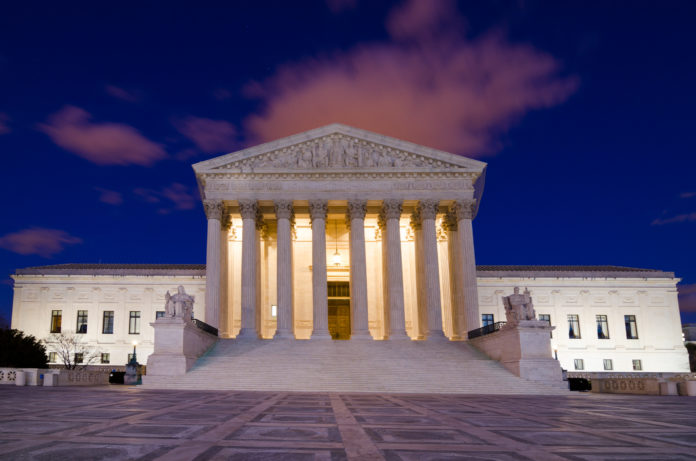Orthodox Jews involved in the public sphere know well what it’s like to have their positions angrily attacked and their words misrepresented. And so, MEMO TO THE U.S. SUPREME COURT: “Welcome to the club.”
An unprecedented campaign of vilification and false accusations, fueled by unconcealed animus, is being waged against the members—at least most of them—of the highest court in the land.
The stew of obloquy has been brewing for some time and was brought to near-boiling by a series of decisions the court has made over recent months that its critics consider too friendly to religious concerns. But the roiling pot of grievances overflowed explosively with the Court’s reversal of Roe v. Wade, the landmark 1973 decision that made abortion a Constitutional right.
Back in March, the Court (in an 8-1 decision) ruled that Texas needed to grant a convicted murderer his request to have his pastor touch and pray with him during his execution. In May, it ruled, 9-0, that Boston had violated the free speech rights of a Christian group by refusing to fly its flag as part of a program in a public plaza, because other private groups were permitted to use the flagpole.
And last month, in a 6-3 decision, the Supremes sided with two Christian families who challenged a Maine tuition assistance program that excluded private religious schools, ruling that the exclusion was unconstitutional.
In another 6-3 ruling, the Court held that government may not suppress an individual from engaging in personal religious observance, effectively jettisoning the strict “Lemon test,” which has been used to overly restrict government “entanglement” with religion.
But it was Roe’s reversal that unleashed the full fury of secularists scorned. New York Times columnist Jamelle Bouie called the Court “reckless, reactionary and power-hungry”; and his comrade veteran reporter Linda Greenhouse tut-tutted her own ruling to the members of the High Court: “What you have finished off is the legitimacy of the court on which you are privileged to spend the rest of your lives.”
Take that, bad justices!
Amid the rancor was the accusation, by senators and pundits alike, that two of the more recently appointed justices, Brett Kavanaugh and Neil Gorsuch, had misled them during their confirmation hearings, in their responses to questions about the status of the Roe decision at the time.
A liberal political action committee, MeidasTouch, caused “#LyingGOP” to trend on Twitter. And House Speaker Nancy Pelosi fumed about how the most recently appointed justices had said “that they respected stare decisis [the principle of respecting precedents]” and the “right of privacy in the Constitution of the United States.”
“Did you hear that?” she asked rhetorically. “Were they not telling the truth then?”
Well, actually, they were. Respect for stare decisis doesn’t mean that settled law isn’t open to reappraisal and reversal. It is a stop sign, not some sort of eternal red light. And the then-nominees to the Court were all very careful, despite being harangued repeatedly to commit to Roe’s eternal immutability, to avoid stating that they would not reappraise Roe or, if they saw fit, vote to reverse it.
Reversals of longstanding rulings are nothing new. There is the 1967 decision Loving v. Virginia, which overturned a ban on interracial marriage that had been in effect for 80 years. The Court decided that regardless of stare decisis, “distinctions drawn according to race” were “odious to a free people whose institutions are founded upon the doctrine of equality.”
And then, of course, there was the 1954 reversal of the famous 1896 Plessy v. Ferguson decision that had legalized racial segregation. And those are just two of the most famous examples.
One wonders how many of the current Court-bashers feel that the longstanding precedents in those cases should have been beyond challenge.
Supreme Court Justice Louis Brandeis wrote in 1932 that “This court has often overruled its earlier decisions, [bowing] to the lessons of experience and the force of better reasoning.”
Reappraisals of things like strict limits on religious expression or how to value nascent life are good examples of the “force of better reasoning.”
They are not radical. In fact, they are long overdue.





















